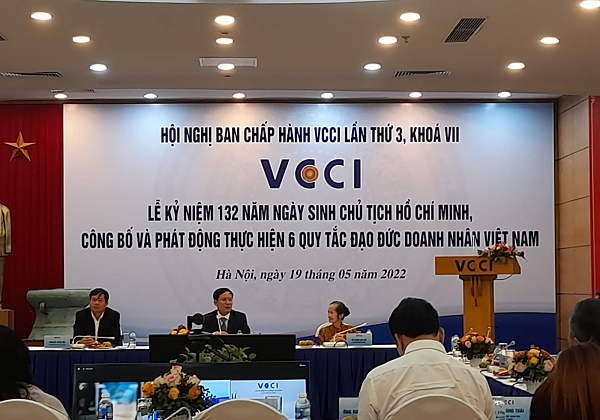Code of Business Conduct and Ethics for Vietnamese Entrepreneurs
The support of state and government officials at all levels is required for the Vietnamese Code of Business Conduct and Ethics to be implemented.

The code of Business Conduct and Ethics for Vietnamese Entrepreneurs was released on the occasion of the 132nd anniversary of President Ho Chi Minh's birthday.
The Code of Business Conduct and Ethics, including six rules, announced by the Vietnam Chamber of Commerce and Industry (VCCI) on President Ho Chi Minh's birthday, May 19, was shared with our reporter by Ms. Pham Chi Lan, an economist.
- Could you tell us more about these six rules of business ethics in Vietnam as a participant in the drafting of the Code of Business Conduct and Ethics for Vietnamese Entrepreneurs?
We've had numerous meetings, including advisory groups with some members of the VCCI Executive Committee, and have contributed significantly to the development of these rules of business ethics.
Of course, we couldn't have as many ideas in the first phase as we wanted. We will only strive to identify the most important and fundamental parts, after which the substance of this Code of Business Conduct and Ethics will be governed by more detailed criteria and guidelines.
Business associations and businesses can do so on that basis. We're also waiting for each business association and company to develop their own criteria for their action plan.
- Can you explain why this Code of Business Conduct and Ethics only goes to the core, helping any entrepreneur, business association, or enterprise to develop their own criteria?
We can't establish a common Code of Business Conduct and Ethics that applies to all businesses and business associations as their culture is diverse. Hence, there can't be a single definition of culture or a single code of ethics that everyone follows.
As a result, we only attempt to provide the most essential rules for businesses to apply. Depending on their activities, each enterprise, business association should actively build their own rules of business ethics.
We believe that the shared rules of business ethics will suit the needs of Vietnamese enterprises and entrepreneurs, as well as those of the state authorities and the entire society.

Ms. Pham Chi Lan, economist, former VCCI Vice- President
- Madam, what do you expect from this Code of Business Conduct and Ethics?
In my opinion, the six ethical rules for Vietnamese entrepreneurs will contribute to the enhancement of Vietnamese cultural values. Because the business community is broad and affects a large number of individuals, including millions of employees.
When corporate leaders establish their own cultural and ethical foundations, they produce a spillover effect that benefits society's cultural development.
This is also VCCI's call to all businesses to join this Code of Business Conduct and Ethics. Voluntarism, in my opinion, will be accomplished in all businesses.
If businesses fail to improve business ethics and culture, they will lose their reputation in the eyes of the whole society. As a result, the 6 rules of business ethics for Vietnamese entrepreneurs will become a shared commitment that the business community will follow and act upon.
The backing of the Government, as well as government leaders at all levels, is essential for the Vietnamese Code of Business Conduct and Ethics to genuinely become the "breath" of each Vietnamese entrepreneur and enterprise.
- How do you rate the current business environment for Vietnamese businesses as well as the regulations that govern business ethics?
The government has consistently made attempts to improve the business environment in Vietnam over the years, and the result of such efforts is plainly remarkable.
In actuality, however, problems can arise from both state authorities and businesses. The VCCI and the business community have worked hard to solve these problems. As a result, the new Code of Business Ethics in Vietnam can only be successfully applied if both parties work together.
Take, for instance, the story of business integrity. The State authorities must act in an honest manner so that enterprises can practice business integrity. The firms will not be able to adopt integrity if there is still corruption.
Take, for example, the tale of business integrity. State officials must operate honestly in order for businesses to practice business integrity. Otherwise, they will be unable to adopt integrity.
Consider the example of business integrity. In order for businesses to practice business integrity, state authorities must act honestly. Otherwise, they won't be able to adopt business integrity.
Therefore, the business integrity standards in this Code of Business Conduct and Ethics will contribute directly to the application of integrity criteria by government officials. From the ground up, businesses might collaborate with state authorities.
The press agency is crucial in this regard, supporting corporations in raising societal issues. Because doing so can be tough for every business.
I believe that by working together, we can promote and demand integrity as a social morality throughout Vietnam, from society to businesses and government officials.
This, I believe, will assist in the quick implementation of anti-corruption measures in our country. These 6 rules of business ethics in Vietnam can be implemented as part of our fight against corruption.
- Madam, how about adhering to the laws governing corporate institutions?
The 13th Party Congress recognized institutional reform as one of the three major breakthroughs that we will continue to make over the next ten years.
On the business side, I'd like to stress that the main philosophy is to follow the laws in the spirit of not doing what the law prohibits, such as conducting conditional business after certain requirements are met.
As for the legal loopholes that the State must close, as well as how to deal with businesses when they do, certain criteria must be established to guide firms to do their best.
Sincerely, thank you!
|
The Vietnamese Code of Business Conduct and Ethics includes:
The first two criteria are ethical standards that entrepreneurs must adhere to in order for their business to be valid and continue to exist. Entrepreneurs must contribute to the state budget while also supporting economic development, job creation, and social welfare. The two rules that follow are guidelines for conducting business, running a business, and engaging with domestic and international partners. The latter two criteria contain the most important characteristics in dealing with nature, the environment, Fatherland, society, and family. |








